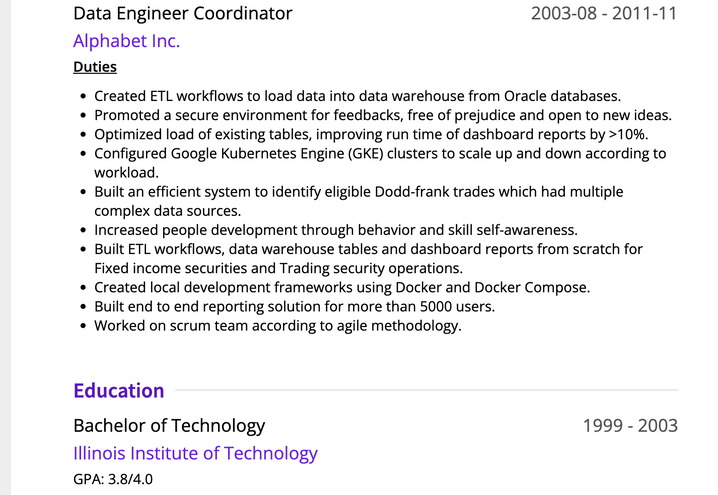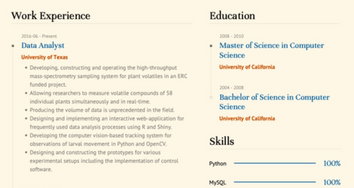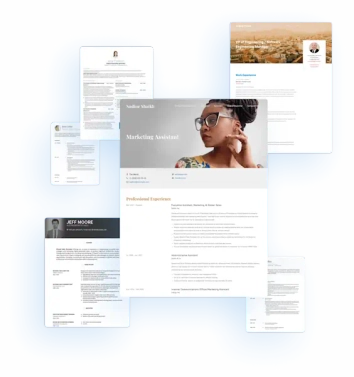
GPA on Resume: How To Include, When To List, Where To List, Examples & More

Including your GPA on your resume can significantly impact your job application, especially if you're a recent graduate or targeting specific industries.
This guide explores when and how to list your GPA, providing tailored advice for various scenarios. Whether you have a high GPA or a lower one, we cover strategies to present your academic achievements effectively.
We delve into specifics, such as highlighting a 4.0 GPA, listing major-specific GPAs, and when to omit GPA altogether. The content also includes examples and tips for formatting your GPA, ensuring it aligns with your overall professional profile. Additionally, we discuss the importance of contextualizing your GPA with other academic and professional experiences.
This comprehensive guide also addresses special cases, such as presenting GPAs for transferred students and handling low GPAs.
By following these guidelines, you can effectively showcase your academic strengths and mitigate any potential drawbacks, helping you create a compelling and balanced resume.
When to Include GPA on Your Resume
Including your GPA on your resume can be a strategic decision that depends on various factors, such as your recentness of graduation, level of professional experience, and the industry you are targeting. Here’s a detailed breakdown of when and how to include your GPA.
1. GPA on Resume for Recent Graduates
GPA on Resume for High GPA (3.5 and above)
If you are a recent graduate with a GPA of 3.5 or higher, it is generally a good idea to include it on your resume. A high GPA can be a strong selling point, showcasing your dedication, intelligence, and ability to excel academically. This can be particularly valuable in competitive job markets or industries where academic performance is highly regarded. Highlighting your GPA can help set you apart from other candidates and demonstrate your potential to employers.
GPA on Resume for Low or Average GPA
For those with a lower or average GPA, including it on your resume may not always be advantageous. If your GPA is below 3.0, it might be better to omit it and instead focus on other strengths, such as relevant coursework, internships, or extracurricular activities that demonstrate your skills and achievements. If you choose to include a lower GPA, be prepared to address it in interviews and pivot the discussion toward your practical experience and other accomplishments.
2. GPA on Resume for Experienced Professionals
Transition from GPA to Work Experience
As you gain more professional experience, the importance of your GPA diminishes. Typically, after three to five years in the workforce, your practical experience and accomplishments should take precedence over academic achievements. At this stage, it’s more beneficial to focus on your career progression, key projects, and the skills you’ve developed on the job. If your GPA was particularly high or relevant to the job you're applying for, you might still mention it, but it should not be the focal point.
Special Cases (Academic Positions, Specialized Fields)
In certain fields, such as academia, research, or specialized industries like law or finance, your academic background may remain relevant longer. In these cases, including your GPA, along with other academic achievements, publications, or certifications, can be important. These details help demonstrate your ongoing commitment to professional development and excellence in your field.
3. GPA on Resume - Industry-Specific Considerations
Fields Where GPA is Critical (e.g., Finance, Engineering)
In industries such as finance, engineering, or consulting, where analytical and technical skills are highly valued, a strong GPA can be a critical component of your resume. Employers in these fields often use GPA as a screening tool to identify candidates with strong quantitative and problem-solving skills. If your GPA is 3.5 or above, it is usually beneficial to include it to enhance your candidacy.
Fields Where GPA is Less Relevant
In creative fields like marketing, communications, or the arts, GPA may be less critical than your portfolio, experience, and creative skills. Employers in these industries are typically more interested in your work experience, creative projects, and the unique perspective you can bring to their team. In such cases, focusing on your achievements, skills, and relevant experiences will be more impactful than highlighting your GPA.
How to List GPA on Your Resume
Including your GPA on your resume can provide a quick snapshot of your academic performance, but it's crucial to present it in the most effective way. Here's how to list your GPA to enhance your resume's appeal.
Placement on the Resume
Education Section
The most common and appropriate place to list your GPA is within the Education section of your resume. This section typically includes your degree, the name of your institution, graduation date, and any honors or awards received. When listing your GPA, it’s best to place it immediately after your degree and school name.
Example of GPA on Education Section
Bachelor of Science in Computer Science
University of Example, 2024
GPA: 3.8/4.0
This placement makes it easy for employers to find and evaluate your academic qualifications quickly.
Certifications and Accomplishments
If you have relevant certifications or notable accomplishments, these can also be highlighted in the Education section or in a separate "Certifications and Accomplishments" section. If your GPA is particularly high and you have received honors or awards (such as Dean's List, magna cum laude), you can list these alongside your GPA to provide a more comprehensive picture of your academic success
Example of Certifications and Accomplishments on Resume
Bachelor of Arts in Economics
Example University, 2023
GPA: 3.9/4.0, Dean’s List (6 semesters), Magna Cum Laude
This approach not only showcases your GPA but also emphasizes your broader academic achievements and dedication, making you a more attractive candidate to potential employers.
Formatting Your GPA on Resume
Presenting your GPA effectively on your resume involves choosing the right format and ensuring accuracy. Here are key considerations for formatting your GPA.
Including Major GPA vs. Cumulative GPA
When listing your GPA, you can choose between your major GPA (GPA within your specific field of study) and your cumulative GPA (overall GPA including all courses). If your major GPA is significantly higher than your cumulative GPA, and it is relevant to the job you're applying for, consider listing the major GPA to highlight your strengths in that particular area. For example:
Bachelor of Science in Engineering
Example University, 2023
Major GPA: 3.9/4.0, Cumulative GPA: 3.6/4.0
This distinction can be particularly useful for technical or specialized positions where expertise in a specific subject area is valued.
Converting GPA to Different Scales
If your GPA is on a different scale than the standard 4.0 scale used in the U.S., you may need to convert it to a 4.0 scale to make it easily understandable for employers. To convert a GPA from a different scale, you can use the following formula:
Converted GPA = (Your GPA / Max GPA on your scale) * 4.0
For instance, if your GPA is on a 5.0 scale, and you scored a 4.5, your converted GPA would be:
Converted GPA = (4.5 / 5.0) * 4.0 = 3.6
Always clarify the scale used if not converting:
GPA: 4.5/5.0 (or 3.6/4.0)
Rounding GPA: Dos and Don'ts
When rounding your GPA, it's crucial to be accurate and honest. Only round your GPA to the nearest hundredth (two decimal places) if it improves clarity. For example, if your GPA is 3.784, you can round it to 3.78. Avoid rounding up to the next significant figure, as this can be misleading and may be considered dishonest by potential employers.
Correct:
GPA: 3.78/4.0
Incorrect:
GPA: 3.8/4.0 (if actual GPA is 3.78)
Accuracy and transparency are key; employers may verify your GPA, and any discrepancies can harm your credibility.
Examples of GPA on Resume
Including your GPA on your resume can be done in various ways, depending on your academic achievements and the relevance of your GPA to the job you're applying for. Here are some examples:
High GPA Example
If you have a high GPA (typically 3.5 or above), it can be a strong indicator of your academic performance and dedication. This is especially important for recent graduates applying for competitive positions.
Example:
Bachelor of Science in Computer Science
XYZ University, 2023
GPA: 3.9/4.0
This format highlights the GPA clearly and places it in the Education section, making it easy for employers to find and evaluate.
Major GPA Example
When your major GPA is significantly higher than your cumulative GPA, and it is relevant to the job, showcasing your major GPA can emphasize your strengths in specific areas.
Example:
Bachelor of Arts in Psychology
ABC College, 2022
Major GPA: 3.8/4.0, Cumulative GPA: 3.4/4.0
This approach is particularly useful for fields where specialized knowledge is crucial, as it draws attention to your expertise in your major.
Without GPA Example
If your GPA is not particularly high or if you have substantial work experience that outweighs your academic achievements, you may choose to omit your GPA altogether. Instead, focus on relevant coursework, honors, or other academic accomplishments.
Example:
Bachelor of Business Administration
DEF University, 2021
Relevant Coursework: Financial Analysis, Marketing Strategies, Business Ethics
Dean's List (3 semesters)
This format allows you to highlight relevant academic experiences without drawing attention to a lower GPA. It also shifts the focus to your practical skills and honors, which may be more relevant to the job you're seeking.
Transfer Student GPA Example
If you transferred schools and have multiple GPAs, it's essential to clarify your academic history. You can list both GPAs or combine them into a single cumulative GPA, depending on what presents you in the best light.
Example of Transfer Student GPA Example
Bachelor of Arts in English
GHI University, 2023
Cumulative GPA: 3.5/4.0
Transfer GPA: 3.7/4.0 (LMN College)
This approach ensures transparency and provides a complete view of your academic performance across different institutions.
Honors and Awards with GPA Example
If you have received honors or awards, mentioning these alongside your GPA can highlight your academic achievements and dedication.
Example of Honors and Awards with GPA Example
Bachelor of Science in Biology
University of PQR, 2022
GPA: 3.8/4.0, Summa Cum Laude
Honors: Phi Beta Kappa, Research Excellence Award
This example showcases not only your GPA but also additional accolades, giving a fuller picture of your academic success and contributions.
How to List 4.0 GPA on Resume
A 4.0 GPA represents perfect academic achievement, making it a standout feature on your resume. Highlighting a 4.0 GPA can demonstrate your dedication, consistency, and mastery of the coursework. It's particularly valuable if you're a recent graduate or applying for positions in competitive industries.
Example:
Bachelor of Science in Electrical Engineering
XYZ University, 2023
GPA: 4.0/4.0
Tips:
- Emphasize Honors: Mention any honors or awards received, such as "Summa Cum Laude" or "Dean's List."
- Include Relevant Coursework: Highlight advanced or specialized courses that align with the job you're applying for.
- Avoid Overemphasis: Balance the GPA with other sections like skills, experience, and projects.
How to List 3.8 GPA on Resume
A 3.8 GPA indicates strong academic performance and is impressive across most disciplines. This GPA is high enough to include prominently on your resume, especially for roles in fields that value academic excellence.
Example:
Bachelor of Arts in Marketing
ABC University, 2022
GPA: 3.8/4.0
Tips:
- Showcase Relevant Skills: Tie your GPA to specific skills or projects completed during your studies.
- Highlight Major GPA: If your major GPA is higher, consider listing it alongside or instead of your overall GPA.
- Include Extracurriculars: Mention any relevant extracurricular activities or leadership roles.
How to List 3.5 GPA on Resume
A 3.5 GPA is considered good and can be particularly valuable for recent graduates. It's a solid indicator of your academic capabilities and can be highlighted to show your consistency and competence.
Example:
Bachelor of Science in Computer Science
DEF College, 2021
GPA: 3.5/4.0
Tips:
- Contextualize Your GPA: Pair your GPA with significant academic projects or papers.
- Emphasize Practical Experience: Balance your academic achievements with internships, part-time jobs, or relevant coursework.
- Consider Rounding Up: If your GPA is slightly below 3.5, consider rounding to one decimal place (e.g., 3.48 to 3.5) if it accurately represents your achievement.
How to List 3.2 GPA on Resume
A 3.2 GPA is above average and can still be highlighted, especially if accompanied by strong work experience or extracurricular achievements. It shows a consistent academic effort and capability.
Example:
Bachelor of Arts in Sociology
GHI University, 2022
GPA: 3.2/4.0
Tips:
- Focus on Strengths: If your GPA isn't your strongest asset, emphasize other academic or professional strengths.
- Include Relevant Courses: Highlight courses that are directly relevant to the job you're applying for.
- Mention Improvement: If your GPA improved significantly during your studies, consider noting this trend.
How to List 3.0 GPA on Resume
A 3.0 GPA is considered average and may not always need to be highlighted unless specifically requested by the employer. Focus on other strengths and skills that align with the job role.
Example:
Bachelor of Business Administration
JKL College, 2021
GPA: 3.0/4.0
Tips:
- Highlight Relevant Experience: Use your work experience and internships to showcase your skills.
- Include Academic Projects: Highlight significant projects or papers that demonstrate your expertise and dedication.
- Be Honest and Accurate: Always present your GPA honestly and consider leaving it off if it doesn't strengthen your application.
How to List 2.8 GPA on Resume
A 2.8 GPA is below average, and including it on your resume should be considered carefully. Focus on other strengths and experiences that can compensate for a lower GPA.
Example:
Bachelor of Arts in Journalism
XYZ University, 2021
GPA: 2.8/4.0
Tips:
- Highlight Relevant Experience: Emphasize internships, freelance work, or any hands-on projects that showcase your skills.
- Focus on Achievements: Include any awards or recognitions that demonstrate your capabilities outside of GPA.
- Address in Cover Letter: If necessary, explain the context of your GPA in your cover letter, focusing on how you've grown and what you've learned from your experiences.
How to List 2.5 GPA on Resume
A 2.5 GPA is considered below average, and it's often advisable to omit it from your resume unless specifically requested. If included, balance it with strong work experience or other achievements.
Example:
Bachelor of Science in Marketing
ABC College, 2020
GPA: 2.5/4.0
Tips:
- Emphasize Skills and Experience: Highlight your practical skills and any relevant job experience that aligns with the position you're applying for.
- Include Professional Development: Mention any additional training, certifications, or courses that demonstrate your commitment to professional growth.
- Showcase Transferable Skills: Focus on skills like communication, teamwork, and problem-solving that you've developed through your experiences.
How to List 2.0 GPA on Resume
A 2.0 GPA is quite low, and it's generally best to leave it off your resume unless the job application specifically requires it. Instead, focus on other qualifications and strengths.
Example:
Bachelor of Arts in English
DEF University, 2019
GPA: 2.0/4.0
Tips:
- Highlight Professional Experience: Concentrate on any relevant work experience, internships, or volunteer work that showcases your skills and dedication.
- Focus on Strengths: Emphasize strong points like projects, leadership roles, or specific skills that are relevant to the job.
- Consider Additional Explanations: If your GPA was affected by specific circumstances, consider briefly addressing it in your cover letter, focusing on your growth and the positive steps you've taken since.
How to List Below 2.0 GPA on Resume
Including a GPA below 2.0 is generally not advisable unless specifically requested by an employer. In such cases, you should accompany it with strong examples of your skills and work experience.
Example:
Bachelor of Science in Sociology
GHI College, 2018
GPA: 1.9/4.0
Tips:
- Avoid Emphasizing GPA: Focus on highlighting your strengths in other areas, such as work experience, skills, and achievements.
- Address Directly if Needed: If asked about your GPA, be honest and use it as an opportunity to discuss what you've learned and how you've improved since then.
- Focus on Future Potential: Highlight your enthusiasm for learning and growing in your field, demonstrating how you've gained valuable skills through experience.
When to Avoid Listing GPA on Your Resume
1. Low GPA Considerations
- Below 3.0 GPA: A GPA under 3.0 may not reflect favorably on your academic record.
- Alternative Focus: Emphasize relevant coursework, internships, or extracurricular activities instead.
- Highlight Skills and Projects: Showcase specific skills or projects that demonstrate your qualifications for the job.
2. Significant Work Experience
- Over Five Years of Experience: For experienced professionals, GPA becomes less relevant.
- Emphasize Professional Accomplishments: Focus on work history, leadership roles, and significant achievements.
- Skills Over Academic Scores: Highlight the skills and competencies developed through your career.
Industry Preferences
- Creative and Practical Fields: Industries like marketing, design, or the arts may prioritize practical experience over academic performance.
- Showcase Portfolio and Projects: Use your resume to highlight portfolio pieces, creative projects, and relevant skills.
- Less Emphasis on GPA: In these industries, GPA is often not a primary consideration.
3. When GPA is Not Required
- Job Posting Does Not Request GPA: If not specified, leaving GPA off can keep the focus on your most relevant qualifications.
- Highlight Practical Skills: Use the resume space to detail your practical skills, experiences, and contributions.
- Maintain Targeted Relevance: Ensure that your resume remains focused and relevant to the job you're applying for, emphasizing aspects that demonstrate your fit for the role.
- When to Include GPA on Your Resume
- How to List GPA on Your Resume
- Formatting Your GPA on Resume
- Examples of GPA on Resume
- How to List 4.0 GPA on Resume
- How to List 3.8 GPA on Resume
- How to List 3.5 GPA on Resume
- How to List 3.2 GPA on Resume
- How to List 3.0 GPA on Resume
- How to List 2.8 GPA on Resume
- How to List 2.5 GPA on Resume
- How to List 2.0 GPA on Resume
- How to List Below 2.0 GPA on Resume
- When to Avoid Listing GPA on Your Resume

Written By
Madison Norton
VP Marketing & Resume Expert
Madison is the VP Marketing and General Manager at VisualCV. He's a seasoned marketing leader, resume writing and career marketing expert and now helping people grow their own career marketing strategies to build a career they love.

Learn how to write a targeted resume that matches job descriptions with precision. Discover tips on customizing your resume using keywords, optimizing for ATS, and highlighting relevant skills and experiences to improve your job application success.
July 19, 2024
Read Post

VP Marketing & Resume Expert

Resume formatting tips and examples for all jobs and experience levels. Learn how to best format your resume and land that dream job in 2025!
February 4, 2025
Read Post

VP Marketing & Resume Expert

Review the International Resume + CV Guide for 2025. Get tips crafting a standout resume tailored to each location's unique job market requirements.
February 6, 2025
Read Post

VP Marketing & Resume Expert
Copyright ©2025 Workstory Inc.